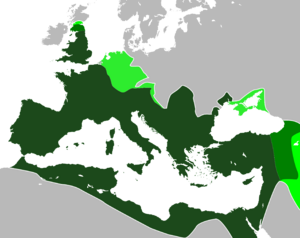Roman facts for kids
The word Roman or Romans can mean different things, but it usually refers to something or someone connected to the ancient city of Rome, which is now the capital of Italy. It can also describe things from the powerful Roman Empire or even a type of story!
History of the Romans
The history of the Romans is long and fascinating, stretching over many centuries.
Ancient Rome: A Powerful Civilization
Ancient Rome was a huge civilization that lasted from around 753 BC to 476 AD. It started as a small town and grew into a massive empire.
- Roman Kingdom (753 BC to 509 BC): This was the earliest period when Rome was ruled by kings.
- Roman Republic (509 BC to 27 BC): After the kings, Rome became a republic. This meant citizens elected their leaders. It was a time of great expansion.
- Roman Empire (27 BC to 476 AD): The Republic eventually became an empire, ruled by emperors. This was when Rome was at its most powerful, controlling vast lands across Europe, Africa, and Asia.
Roman Influence Across Lands
The Romans left their mark on many places and aspects of life.
- Roman Britain: This was the part of the island of Great Britain that the Roman Empire controlled from about 43 AD to 410 AD. They built roads, towns, and forts there.
- Roman Alphabet: The Roman alphabet is the writing system used for most languages in Western and Central Europe today, including English!
- Roman Army: The Roman army was one of the most effective fighting forces in ancient history. They were well-trained and organized.
- Roman Calendar: The Roman calendar was the basis for the calendar we use today. Julius Caesar made important changes to it.
- Roman Law: The Roman law system was very advanced for its time. Many of its ideas are still used in legal systems around the world.
- Roman Numerals: Roman numerals are a system where letters like I, V, X, L, C, D, and M are used to represent numbers. You might still see them on clocks or in book chapters.
- Roman Mythology: Roman mythology is a collection of stories about gods, goddesses, and heroes. These myths were important to Roman religion and culture.
The Eastern Roman Empire
The Byzantine Empire (from 330 AD to 1453 AD) is also known as the Eastern Roman Empire. It continued the traditions of the Roman Empire in the East after the Western part fell. Its capital was Constantinople (modern-day Istanbul).
The Holy Roman Empire
The Holy Roman Empire (around 900 AD to 1806 AD) was a large medieval state in Central Europe. Even though it had "Roman" in its name, it was different from the ancient Roman Empire. It was a collection of many smaller states.
Places Named Roman
Many places around the world are named "Roman" or "Romans."
- Roman, Bulgaria: A town in Bulgaria.
- Romans-sur-Isère: A town in France.
- Roman, Romania: A city in Romania.
- Roman roads: These were the amazing roads built by the ancient Romans, many of which are still visible today!
Roman in Christianity
The word "Roman" is also important in Christianity.
- Epistle to the Romans: This is a letter found in the New Testament of the Christian Bible. It was written by Saint Paul.
- Roman Catholic Church: The Roman Catholic Church is the largest Christian church in the world. Its head, the Pope, lives in Rome.
Roman in Literature
In many European languages, the word for "novel" is similar to "Roman."
- Bildungsroman: This is a German word for a "coming-of-age story." It's a type of novel that follows a character's journey from childhood to adulthood, showing how they grow and learn.
- Romance (heroic literature): This refers to a type of heroic story from the Middle Ages, often about knights, quests, and love.
- Roman à clef: This is a French term for a novel that tells a real-life story but uses fictional names and settings to hide the true identities of the people involved.
See also
 In Spanish: Roman para niños
In Spanish: Roman para niños
 | Stephanie Wilson |
 | Charles Bolden |
 | Ronald McNair |
 | Frederick D. Gregory |


